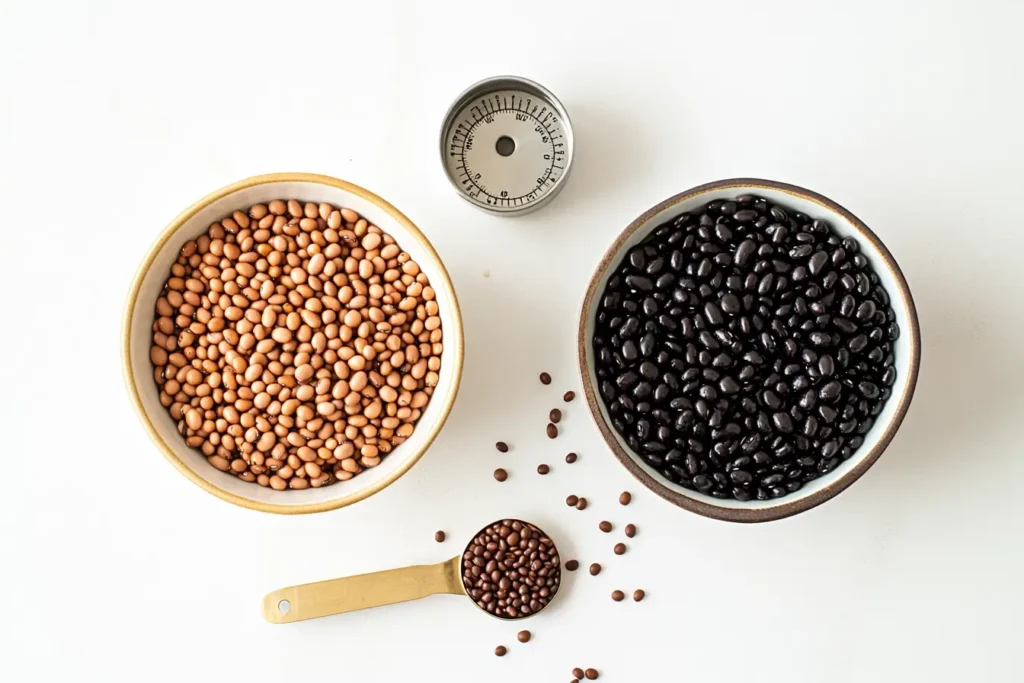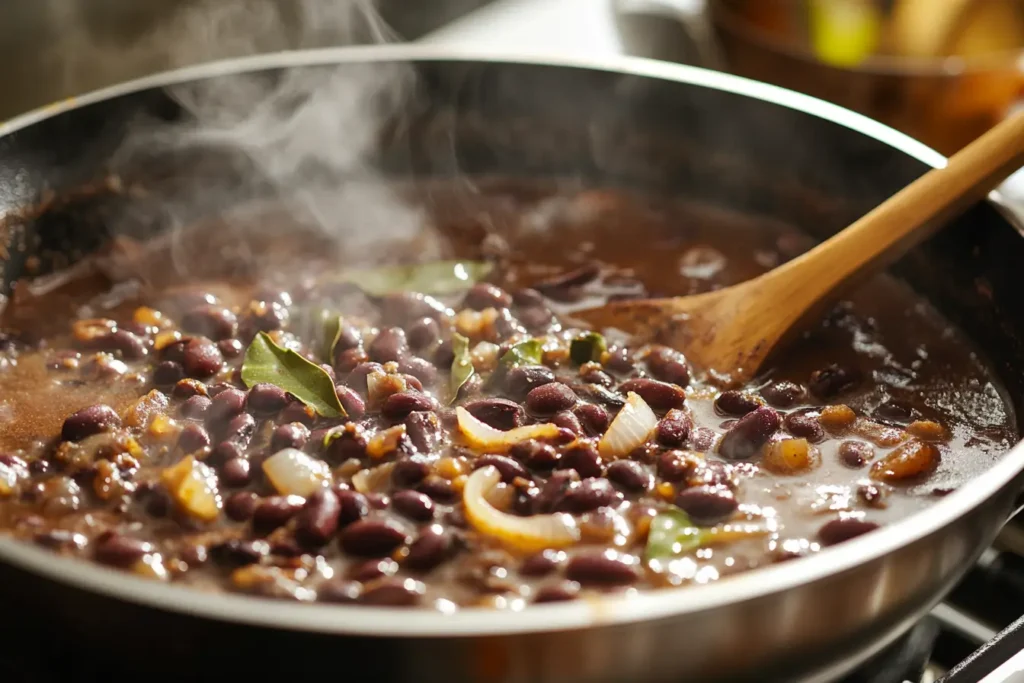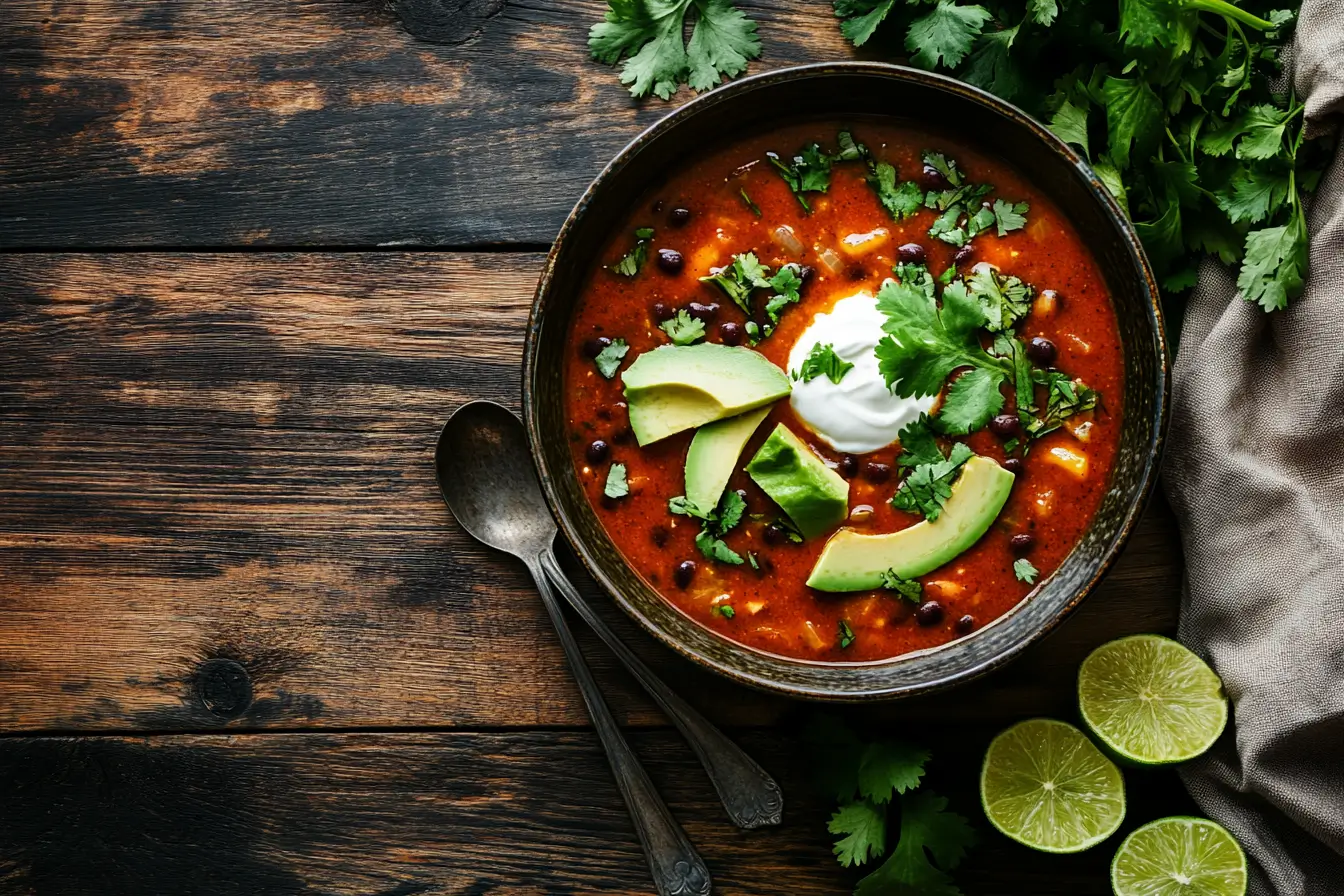Cooking black beans brings up a question that divides even the most experienced home cooks: Do you have to soak black beans before making soup? For years, the debate has raged on, with some firmly believing soaking is necessary for faster cooking and better digestion, while others argue it’s an extra step you can skip.
But here’s the surprising part: skipping the soak doesn’t just save time—it can actually lead to a more flavorful black bean soup. By cooking black beans directly, you allow them to absorb the rich flavors of the broth and seasonings, creating a meal that is both satisfying and delicious. In this article, we’ll tackle the science behind soaking, explore cooking methods, and share tips to make your black bean soup the highlight of your next lunch.
If you’ve ever wondered whether soaking beans is really worth it, or if skipping the soak could lead to better results, you’re in the right place. Let’s dive into everything you need to know to cook black beans that are perfect every time.
The Soaking Debate: What’s the Buzz About?
For generations, soaking dried beans has been considered the “right” way to prepare them. It’s often said that soaking helps beans cook faster and makes them easier to digest. While these reasons might seem compelling, the reality is a little more nuanced, especially when it comes to black beans.
Soaking beans involves covering them in water for 8–12 hours, typically overnight, before cooking. Proponents of soaking argue that it:
- Reduces cooking time by softening the beans in advance.
- Improves digestibility by reducing compounds like oligosaccharides that can cause bloating.
- Helps older beans soften more easily during cooking.
However, recent studies and kitchen experiments have shown that soaking isn’t always necessary. In fact, for soups like black bean soup, skipping the soak can actually enhance the depth of flavor. This is because unsoaked beans absorb the seasonings and broth more effectively, resulting in a thicker, richer soup.
Soaked vs. Unsoaked Beans: A Quick Comparison
| Aspect | Soaked Beans | Unsoaked Beans |
|---|---|---|
| Cooking Time | 45–60 minutes (stovetop) | 60–70 minutes (stovetop) |
| Flavor | Mild, diluted broth | Rich, concentrated broth |
| Texture | Softer but can be mushy | Firmer, creamier texture |
| Broth Thickness | Thinner, less flavorful | Thicker, naturally creamy |
So, do you have to soak black beans before making soup? If time isn’t a critical factor and flavor is your priority, the answer is a resounding no.
For more tips on achieving the perfect texture and flavor in your soup, check out our article on Actually Good Homemade Vegetable Soup Flavor Tips.
The Science of Black Beans
Black beans are a unique legume, prized for their small size, creamy texture, and rich flavor. Their anatomy and chemical composition make them particularly well-suited for cooking without soaking.

Why Skipping the Soak Works
When black beans are soaked, they absorb water, which softens their outer shell and begins the cooking process. While this might sound like a good thing, it also means they absorb less of the flavorful broth during cooking. By skipping the soak, black beans act like little sponges, soaking up the seasonings, spices, and aromatics you add to your soup. This results in a meal that is not only hearty but bursting with flavor.
Digestion and Nutritional Factors
One of the main reasons people soak beans is to reduce compounds called oligosaccharides, which can cause bloating and gas. However, cooking black beans with aromatics like garlic, onion, or bay leaves can achieve the same effect. Additionally, unsoaked beans retain more nutrients, including iron, magnesium, and fiber, which are essential for a balanced diet.
For more insights into enhancing the flavor of your soup, read What is the Secret Ingredient in Soup?.
Step-by-Step Guide to Cooking Black Beans Without Soaking
If you’re ready to skip the soaking process, here’s how to cook black beans from scratch to perfection. Whether you’re using a stovetop, slow cooker, or pressure cooker, these methods ensure delicious results.

Preparation
- Sort: Spread your beans on a flat surface to remove any debris or damaged beans.
- Rinse: Wash the beans thoroughly under cold running water.
Cooking Methods
- Stovetop
- Add 1 cup of dried black beans to a large pot. Cover with 3–4 cups of water.
- Add aromatics such as chopped onion, minced garlic, and a bay leaf for extra flavor.
- Simmer over medium heat for 60–70 minutes, stirring occasionally. Add water if needed to keep the beans submerged.
- Slow Cooker
- Place 1 cup of beans, 4 cups of water, and seasonings into the slow cooker.
- Cook on high for 3–4 hours or low for 6–7 hours.
- Pressure Cooker
- Combine 1 cup of beans with 3 cups of water in the pressure cooker.
- Add spices like cumin or smoked paprika.
- Cook on high pressure for 25–30 minutes, then allow natural pressure release.
| Cooking Method | Time (Unsoaked Beans) |
|---|---|
| Stovetop | 60–70 minutes |
| Slow Cooker | 3–4 hours (high) |
| Pressure Cooker | 25–30 minutes |
Once the beans are tender but not mushy, they’re ready to be used in your black bean soup.
Looking for inspiration? Try this Black Bean Soup Recipe to see how unsoaked beans create a deliciously hearty dish.
Ingredients and Flavor Boosters for Black Bean Soup
Creating a flavorful black bean soup starts with the right ingredients. Here’s what you’ll need:
Base Ingredients
- Black Beans: 1 pound of dried beans (about 2 cups).
- Vegetables: Onion, garlic, and carrots for a robust base.
- Broth: Chicken or vegetable broth adds depth.
Seasonings and Aromatics
- Spices: Cumin, smoked paprika, and chili powder.
- Aromatics: Bay leaves, fresh thyme, and a splash of adobo sauce.
- Acid: Lime juice or vinegar balances the soup’s richness.
Garnishes
- Fresh cilantro
- Sliced avocado
- Tortilla chips
- A dollop of sour cream or yogurt
By layering flavors with spices and aromatics, you ensure your soup is anything but bland.
Tips for Perfect Black Bean Soup
The key to a great black bean soup lies in balance. Here are a few tips to keep in mind:
- Bean-to-Water Ratio: Stick to 1 cup of beans for every 3–4 cups of water.
- Thickening the Soup: Blend a portion of the beans and broth, then stir it back into the pot.
- Season Gradually: Add salt and spices in stages, tasting frequently to ensure the flavors are just right.
For a high-protein option, try this Ultimate Guide to Protein Cornbread.
Serving Suggestions and Pairings
Black bean soup is versatile and pairs beautifully with a variety of sides:
- Cornbread: Perfect for dipping into the thick broth. Check out the “Perfect Side for Black Bean Soup” for recipes.
- Rice: A classic pairing that makes the meal heartier.
- Creative Toppings: Garnish with pickled onions, shredded cheese, or crumbled bacon for extra texture.

Common Myths About Soaking Black Beans
There are plenty of myths surrounding bean preparation. Let’s clear up a few:
- Myth 1: Soaking is Mandatory: Skipping the soak can produce even better results in terms of flavor.
- Myth 2: Unsoaked Beans Are Harder to Digest: Cooking with aromatics like garlic or bay leaves helps digestion just as much as soaking.
- Myth 3: Soaking Always Saves Time: While soaking can cut cooking time slightly, the difference is minimal for black beans.
Storage and Reheating Tips
Black bean soup tastes even better the next day. Here’s how to store it properly:
- Refrigeration: Store in an airtight container for up to 3 days.
- Freezing: Freeze portions with the cooking liquid for up to 3 months.
To reheat, warm the soup gently on the stovetop, adding a splash of water if it has thickened too much.
For more information on the health benefits of black bean soup, visit Is Black Bean Soup Good for You?.
Final Thoughts: Why Not Soaking Is the Flavorful Choice
When it comes to black bean soup, skipping the soak is more than a time-saver—it’s a flavor-booster. By cooking beans directly, you create a soup that’s rich, hearty, and full of depth. Whether you’re feeding a family or meal-prepping for the week, this method ensures delicious results every time.
So, do you have to soak black beans before making soup? The answer is clear: skip the soak, savor the flavor, and enjoy the best black bean soup you’ve ever made.
FAQs
Is Black Bean Soup Good for You?
Yes, black bean soup is incredibly good for you! It’s a powerhouse of nutrients, offering protein, fiber, vitamins, and minerals in every serving. With its low fat content and high nutritional value, black bean soup supports heart health, aids digestion, and helps maintain steady energy levels throughout the day.
What Are the Benefits of Black Bean Soup?
Black bean soup is packed with benefits:
Rich in Protein: Great for muscle repair and growth, especially for vegetarians and vegans.
High in Fiber: Supports digestion and keeps you full longer, making it ideal for weight management.
Heart-Healthy: The soup contains potassium and magnesium, which help regulate blood pressure.
Nutrient Dense: Loaded with iron, folate, and antioxidants, which promote overall health.
Low Glycemic Index: Helps maintain steady blood sugar levels, making it diabetes-friendly.
What Do Black Beans Do for Your Body?
Black beans provide essential nutrients that improve your overall health.
Improve Digestion: The fiber content promotes regularity and prevents constipation.
Boost Energy: Rich in iron, black beans help prevent fatigue by supporting healthy red blood cell production.
Support Bone Health: Magnesium, calcium, and phosphorus in black beans strengthen bones.
Combat Inflammation: Antioxidants like anthocyanins reduce inflammation and protect cells.
Is It Healthy to Eat Bean Soup Every Day?
Yes, eating bean soup daily can be part of a healthy diet, but balance is key. Black bean soup is nutrient-dense, helping you meet your daily fiber and protein needs. However, ensure your diet also includes other food groups like vegetables, fruits, and grains to avoid potential issues like bloating or excessive sodium intake if the soup is heavily salted.
Do Black Beans Burn Belly Fat?
While black beans alone don’t directly burn belly fat, they can aid in weight loss and fat reduction. Their high fiber and protein content keep you full longer, reducing overall calorie intake. Additionally, black beans stabilize blood sugar levels, preventing hunger spikes that lead to overeating. Combined with a balanced diet and regular exercise, black beans can be a helpful part of your weight loss journey.

